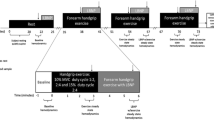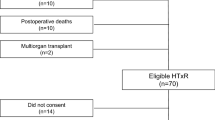Abstract
Background
Blunted reflex muscle vasodilatory response during exercise in heart failure (HF) patients may be secondary to augmented vasoconstriction. We tested the hypothesis that the exaggerated sympathetic nerve activity restrains the reflex muscle vasodilatation during exercise in HF patients.
Methods
We studied the reflex vasodilatory response (plethysmography) during 3 min static handgrip exercise at 30% maximal voluntary contraction in 10 advanced HF patients (45 ± 3year, NYHA Functional Class III/IV) and 10 age-matched normal controls (NC, 40 ± 3year, P = 0.23) during intra-arterial infusion of: (1) saline control; and (2) alpha-adrenergic blocker (phentolamine).
Results
Baseline forearm vascular conductance (FVC) was lower in HF patients than in NC (2.07 ± 0.2 vs. 4.26 ± 0.6 units, respectively; P = 0.002). FVC responses during exercise increased significantly in NC, but not in HF patients (delta changes: 1.05 ± 0.4 vs. 0.05 ± 0.2 units, respectively). Phentolamine significantly increased resting FVC in HF patients (from 2.07 ± 0.2 to 5.74 ± 0.7 units, P = 0.00004) and restored reflex vasodilatory responses during exercise (delta changes: from 0.05 ± 0.2 to 1.82 ± 0.9 units) eliminating the difference in FVC between both groups.
Conclusions
The blunted reflex muscle vasodilatory response during exercise in advanced HF patients is, at least in part, due to the increase in sympathetic nerve activity.



Similar content being viewed by others
References
Dietz NM, Engelke KA, Samuel TT, Fix RT, Joyner MJ (1997) Evidence for nitric oxide-mediated sympathetic forearm vasodilatation in humans. J Physiol 498:531–540
Dyke CK, Proctor DN, Dietz NM, Joyner MJ (1995) Role of nitric oxide in exercise hyperaemia during prolonged rhythmic handgripping in humans. J Physiol 488:259–265
Fenton AM, Hammill SC, Rea RF, Low PA, Shen WK (2000) Vasovagal syncope. Ann Intern Med 133:714–725. Review
Hirooka Y, Imaizumi T, Tagawa T, Shiramoto M, Endo T, Ando S, Takeshita A (1994) Effects of L-arginine on impaired acetylcholine-induced and ischemic vasodilation of the forearm in patients with heart failure. Circulation 90:658–668
Imaizumi T, Takeshita A, Suzuki S, Yoshida M, Ando S, Nakamura M (1990) Age-independent forearm vasodilatation by acetylcholine and adenosine 5′- triphosphate in humans. Clin Sci 78:89–93
Katz SD, Krum H, Khan T, Knecht M (1996) Exercise-induced vasodilation in forearm circulation of normal subjects and patients with congestive heart failure: role of endothelium-derived nitric oxide. J Am Coll Cardiol 28:585–590
Katz SD, Schwarz M, Yuen J, LeJemtel TH (1994) Impaired acetylcholine-mediated vasodilation in patients with congestive heart failure. Role of endothelium-derived vasodilating and vasoconstricting factors. Circulation 88:55–61
Kubo SH, Rector TS, Bank AJ, Williams RE, Heifetz SM (1991) Endothelium-dependent vasodilatation is attenuated in patients with heart failure. Circulation 84:1589–1596
Middlekauff HR, Nguyen AH, Negrão CE, Nitzsche EU, Hoh CK, Natterson BA, Hamilton MA, Fonarow GC, Hage A, Moriguchi JD (1997) Impact of acute mental stress on sympathetic nerve activity and regional blood flow in advanced heart failure. Circulation 96:1835–1842
Murchie KJ, Jennings GL, Kingwell BA (2000) Supplemental oxygen does not modulate responses to acetylcholine or ascorbic acid in the forearm of patients with congestive heart failure. Clin Sci 99:57–63
Negrão CE, Hamilton MA, Fonarow GC, Hage A, Moriguchi JD, Middlekauff HR (2000) Impaired endothelium-mediated vasodilation is not the principal cause of vasoconstriction in heart failure. Am J Physiol Heart Circ Physiol 278:H168–H174
Negrão CE, Rondon MU, Tinucci T, Alves MJN, Roveda F, Braga AM, Reis SF, Nastari L, Barretto AC, Krieger EM, Middlekauff H (2001) Abnormal neurovascular control during exercise is linked to heart failure severity. Am J Physiol Heart Circ Physiol 280:H1286–H1292
Santos AC, Alves MJN, Rondon MUPB, Barreto ACP, Middlekauff HR, Negrão CE (2005) Sympathetic activation restrains endothelial-mediated muscle vasodilatation in heart failure patients. Am J Physiol Heart Circ Physiol 289:H593–599
Stanton CM, Low PA, Hodge DO, Shen W (2007) Vasovagal syncope in patients with reduced left ventricular function. Clin Auton Res 17:33–38
Wallin BG, Sundlof G (1982) Sympathetic outflow to muscles during vasovagal syncope. J Auton Nerv Syst 6:287–291
Zelis R, Mason DT, Braunwald E (1968) A comparison of the effects of vasodilator stimuli on peripheral resistance vessels in normal subjects and in patients with congestive heart failure. J Clin Invest 47:960
Acknowledgments
We want to express our gratitude to the Fundação de Amparo à Pesquisa do Estado de São Paulo, São Paulo—SP (FAPESP, 01/00009-0 and 2005/59740-7), and Fundação Zerbini, São Paulo—SP for granting our study. Dr. Carlos E. Negrao and Dr. Maria U. Rondon were supported by Conselho Nacional de Pesquisa (CNPq # 304304/2004-2 and #305159/2005-4, respectively), and Dr. Holly R. Middlekauff by the National Institutes of Health (Grant RO1 HL084525), USA.
Author information
Authors and Affiliations
Corresponding author
Rights and permissions
About this article
Cite this article
Alves, M.J.N.N., Rondon, M.U.P.B., Santos, A.C. et al. Sympathetic nerve activity restrains reflex vasodilatation in heart failure. Clin Auton Res 17, 364–369 (2007). https://doi.org/10.1007/s10286-007-0448-6
Received:
Accepted:
Published:
Issue Date:
DOI: https://doi.org/10.1007/s10286-007-0448-6




